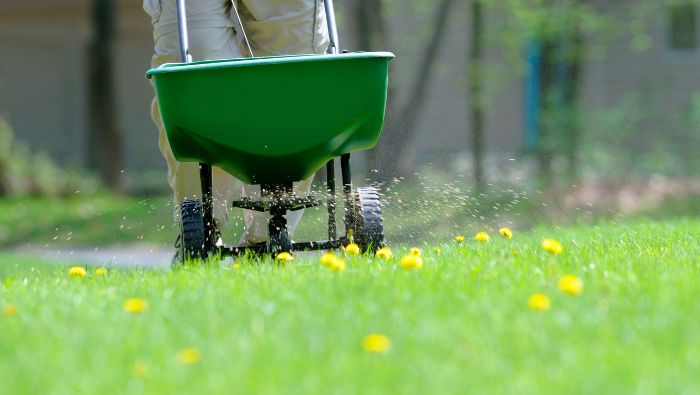Trimming Yard Maintenance Costs: 5 Frugal Lawn Care Tips

How much money do you spend on lawn care every year?
The cost of lawn mowing, fertilizing, pest control and watering adds up quickly. And what if you want to add new plants or landscaping materials to your garden and yard?
Here are some tips to cut lawn and garden care costs and create a healthier outdoor environment.
1. Instead of a Gas-Powered Mower, Use a Reel Mower
A reel mower is the old-fashioned, push mower that was popular decades ago. The new models are more lightweight than their ancestors, yet are as efficient at cutting the grass as a gas-powered mower.
Reel mowers save money from the start. Not only is it less expensive to buy a reel mower than it is to buy a gas or electric mower, but reel mowers also cost nothing to operate, and they require minimal maintenance.
The blades on a reel mower should be sharpened every year, and the reels should be kept greased. You can either sharpen the blades yourself or take them to a lawn and garden store. Blade sharpening is inexpensive and will make the mower more efficient.
Sign Up for Savings
Subscribe to get money-saving content by email that can help you stretch your dollars further.
Twice each week, you'll receive articles and tips that can help you free up and keep more of your hard-earned money, even on the tightest of budgets.
We respect your privacy. Unsubscribe at any time.
2. Instead of Fertilizer, Use Compost
Store-bought fertilizer and mulch can be expensive. Make your own by starting a compost pile. Called black gold by gardening professionals, compost is easier to make than most people think.
Simply pile lawn debris, such as dried leaves and grass clippings, add some food scraps from your kitchen, and turn the pile over every week or so. Composting takes patience. It will take several months to a year for your pile to turn into good compost, but it is a powerful fertilizer.
In addition to saving money on fertilizer, you can make potting soil from your compost. Simply mix compost with some dirt from your garden to get a nutrient-rich soil that you can use to start seeds and transplant seedlings.
3. Instead of Tap Water, Use Rain Water
If you have municipal water, then you most likely have to pay for water. To save money, cut back on the amount of water that you use from the hose or tap to maintain your lawn and garden. For outdoor watering needs, consider purchasing a rain barrel.
Rain barrels are covered barrels that collect the rain runoff from a gutter. The covers keep small animals from falling into the water and also keep the mosquito population down.
Rain water is better for plants than tap water since it doesn’t contain any of the chemicals that municipalities are required to put in the water to make it safe for drinking.
Rain barrels are available at gardening stores at a variety of prices, but to be even more frugal, you can make your own. A quick Internet search will turn up various homemade rain barrel plans.
4. Instead of Buying Plants, Visit a Plant Swap
Save money on bulbs and other perennials by participating in a plant swap. Many local churches hold plant swaps yearly. If yours doesn’t, organize a swap with your neighbors.
5. Instead of Chemicals, Use Natural Pesticides
Not only are pesticides and other lawn and garden chemicals expensive, they can be hazardous to your health. Be frugal and health conscious by using the Internet to research natural solutions to pest problems.
Some common, inexpensive pest solutions are also a pleasant addition to your yard or garden. Planting daffodil bulbs will keep moles out of your yard. Chives are helpful in keeping black spot off of roses when they are planted in the same bed. Marigolds will keep rabbits away from garden vegetables.
Having a lush, healthy lawn and garden does not mean that you need to spend a lot of money. Very often, the frugal way is actually the healthier way. Not only will you be saving money, but also you will be creating an environment that is safe for children and pets and that will help your lawn, vegetables and flowers thrive.
Reviewed July 2023
Sign Up for Savings
Subscribe to get money-saving content by email that can help you stretch your dollars further.
Twice each week, you'll receive articles and tips that can help you free up and keep more of your hard-earned money, even on the tightest of budgets.
We respect your privacy. Unsubscribe at any time.
Popular Articles
- 7 Habits of Highly Frugal People
- 5 Simple Budget Cuts That Can Save $200 a Month
- How to Track Down Unclaimed Funds Owed You
- 32 Ways to Save Money on Your Utility Bills
- Do You Need Credit Life Insurance When Buying a New Car?
- How to Maximize Profits When Selling Online
- Staying Motivated to Continue Digging Yourself Out of Debt
On After50Finances.com
- 9 Things You Need to Do Before You Retire
- You Didn’t Save Enough for Retirement and You’re 55+
- When Empty Nesters Reorganize and Declutter Their Home
- Reinventing Your Career in Your 50s or 60s
- What Mature Homeowners Should Know about Reverse Mortgages
- 2 Reasons to Collect Social Security Benefits As Soon As Possible

